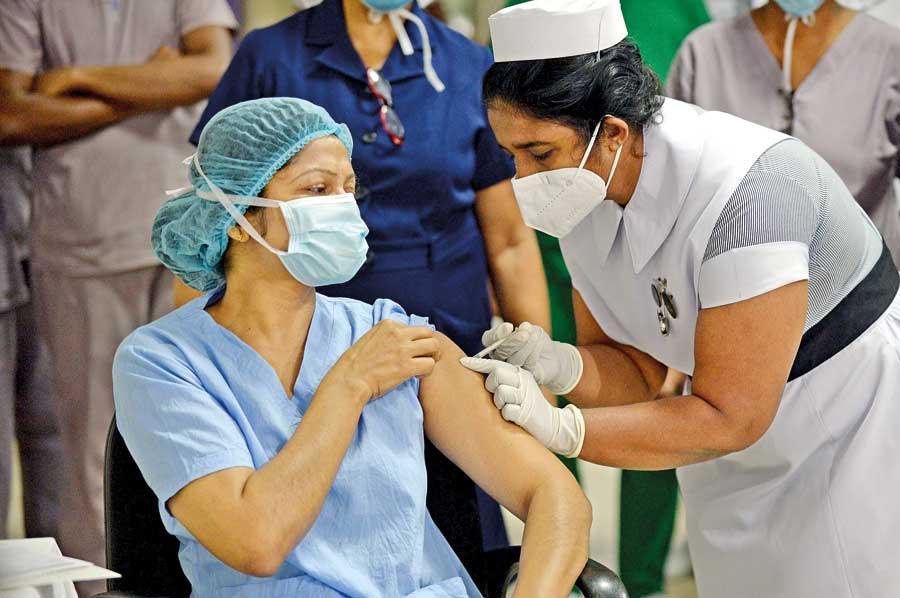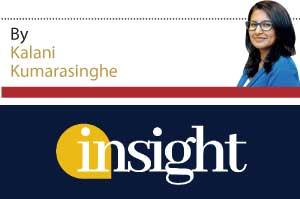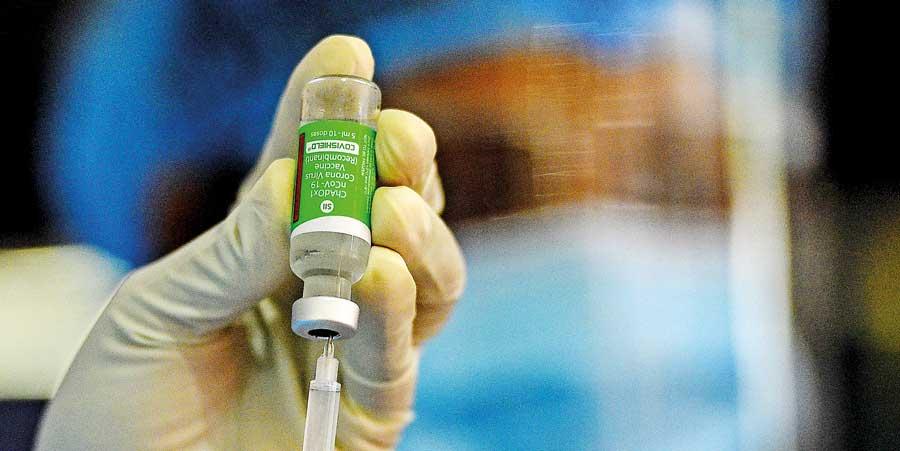10 Feb 2021 - {{hitsCtrl.values.hits}}

The much awaited Covid-19 vaccines arrived in Sri Lanka last month. Some 250,000 frontline workers, including healthcare workers have been inoculated under the first phase of the State’s vaccination programme. The Ministry of Health on Monday debriefed journalists, answering some pertinent questions on the Covid-19 vaccine and the future of the nationwide inoculation programme.
including healthcare workers have been inoculated under the first phase of the State’s vaccination programme. The Ministry of Health on Monday debriefed journalists, answering some pertinent questions on the Covid-19 vaccine and the future of the nationwide inoculation programme.
The following are some excerpts:
"Sri Lanka is likely to receive several types of vaccines through COVAX and via purchase, officials said. The NMRA will issue periodic updates to its evaluation of the vaccines which are available"
Q Does the vaccine give us total protection against Covid-19?
There is no evidence that any of the current vaccines developed against the virus, can completely stop people from contracting the virus. Deputy Director General of Health Services, Dr. Hemantha Herath said though the vaccine would not give you 100 per cent protection, it gives you effective protection. “There is evidence to say that even among people who were infected with Covid-19 after vaccination, the effect of the virus on them has been less and they are less likely to develop complications from the virus,” he said.
Q Who has been vaccinated so far?
Some 161,773 frontline workers, including healthcare workers have been vaccinated following the grant of vaccines by the Indian Government, according to Dr. Hemantha Herath. At least 250,000 frontline workers are expected to be vaccinated by the end of the initial phase of vaccination.
Q How does Sri Lanka get vaccines?
There are two methods countries receive the vaccines. First is the COVAX, programme under the global vaccine alliance, through which every participating country will have equal access to vaccines regardless of income levels.
Sri Lanka is to receive vaccinations to cover 20 per cent of the population through this scheme. Although it is not yet clear, as to which vaccine will be made available through this programme, Dr. Herath said officials have received some indication as to which vaccine will be sent to Sri Lanka. He said COVAX requires countries to be prepared to administer any vaccine, adding that Sri Lanka has made necessary preparations accordingly.
Countries are also able to secure vaccines by purchasing. Dr. Herath said, accordingly, 18 million vaccines are to be imported to cover nine million citizens in Sri Lanka. “Due to the global demand, from procurement to manufacture, there are several delays. It is unlikely that Sri Lanka will receive millions of doses at once, as there is a shortage of vaccines. But we are working to acquire these vaccines as soon as we can,” he said.
"There are three main groups identified so far. The first being those with co-morbidities, for instance, this would mean patients with kidney disease or diabetes. The elderly, who are likely to suffer from co-morbidities would also be vaccinated in a parallel programme " Dr. Hemantha Hertath
Q Is there a decrease in daily vaccinations?
No. According to Dr. Herath, most frontline workers have now been jabbed. “This doesn’t mean that there is a decrease in vaccinations, this doesn’t mean we have run out of vaccinations,” he said and added that authorities were now taking stock of the remainder of the vaccines.
Q When will I be vaccinated?
The nationwide vaccination programme expects to distribute vaccines to 4,000 vaccination centres across the island in the next phase of the programme. At least 300 people will be vaccinated daily, totaling up to 600,000 vaccines countrywide. However this is when the vaccines are made available. The government expects the next consignment of vaccines by the end of February.
According to Health Ministry officials, the priority list of vaccine recipients has been identified. However, the final list of recipients would be named, only when the vaccines arrive. “At present, we do not have information as to how many vaccines we are likely to receive next. Therefore we can only decide on the list, as and when we get the vaccines, depending on availability.
Q Who is in the priority list?
Now that frontline workers have been inoculated, authorities are likely to vaccinate the risk groups in its next phase of vaccination. “There are three main groups identified so far. The first being those with co-morbidities, for instance, this would mean patients with kidney disease or diabetes. The elderly, who are likely to suffer from co-morbidities would also be vaccinated in a parallel programme,” Dr. Herath said. “The third group will be those who are in areas that are important contributors to the economy. They are likely in the productive age, and data shows that the virus spreads the most among this group of people. If we can vaccinate this group quickly, that means we could achieve a greater level of immunity and contain the spread.”
He underscored the fact that however, those included in the priority list will be completely dependent on when and how vaccines are made available.
Q What are the side effects of the vaccine?
Common side effects to Covid-19 vaccines include headache, fever or fatigue. Dr. Ananda Wijewickrama, a member of the National Medicines Regulatory Authority’s Committee on Covid-19 vaccine procurement said however, these are completely normal. He said there was no need to fear the vaccine. “Some even asked me as to why I chose to be vaccinated. In any vaccine, or even medicine, side effects are common. We are happy to say, that no major side effects have been reported from those who were vaccinated. The only concern we have is if some people develop allergic reactions. Hospitals are prepared for this as well. But no such reports have emerged so far,” Dr. Wijewickrama said. “This is a safe vaccine.”
Q Will a person who already contracted Covid-19 be vaccinated?
Dr. Wijewickrama said the current policy of the WHO is to vaccinate those who have already contracted Covid-19 as well. “Sri Lanka will follow a similar policy,” he said.
Q Will I get a vaccine card?
Similar to the infant inoculation programme, once vaccinated, you will receive a card, with information containing your details, the vaccination date, and the date of your next vaccination. These cards are likely to be an important document, especially when travelling overseas.
"Some even asked me as to why I chose to be vaccinated. In any vaccine, or even medicine, side effects are common. We are happy to say, that no major side effects have been reported from those who were vaccinated"
- Dr. Ananda Wijewickrama
Q Who cannot get vaccinated?
Children under the age of 18, pregnant mothers and those with acute Covid-19 complications cannot receive the vaccine, due to insufficient data available, the Ministry said.
Q Once vaccinated, how long does it take for the next vaccination?
Sri Lanka currently follows a vaccination policy of administering the vaccines four weeks apart. However Dr. Herath and Dr. Wijewickrama said the emerging evidence suggest greater efficacy when the second vaccine is administered after 12 weeks. “Currently we follow the four week policy, but this may change in future. This does not mean that we have run out of vaccines,” Dr. Herath said.
Q Will I be guaranteed a second vaccine?
Every person included in the priority list will have a guaranteed second vaccine. The two doses of vaccines are reserved for each person, and the vaccines will not be administered interchangeably.
Q Are the anti-vaccine campaigns on social media to be believed?
Globally, misinformation surrounding Covid-19 has caused the WHO to term it as an infodemic. “I read on one post, that a chip is inserted through this vaccine to obtain personal data, which is to be sent to India. I thought this was ridiculous. It did not make sense, but these things happen,” he said. “The NMRA analysed each and every vaccine before procurement, so I assure you that there is no reason to fear the vaccine,” Dr. Wijewickrama said. “There was a great uproar recently over news items which read that 20 odd elderly persons died after being vaccinated in Denmark. The Committee contacted the vaccine manufacturer to query about this incident. We were then informed that, only persons above 80 years were vaccinated and that a daily average of 400 elderly deaths was reported in Denmark. Twenty out of 400 had been vaccinated; this does not mean that the vaccine is unsafe.”
Q Will Sri Lanka only receive one type of vaccine?
Sri Lanka is likely to receive several types of vaccines through COVAX and via purchase, officials said. The NMRA will issue periodic updates to its evaluation of the vaccines which are available. Dr. Wijewickrama said the NMRA has received several applications for registration, from China’s Sinopharm and Russia’s Sputnik V. “We have requested for more data and information from both these companies to evaluate its
suitability,” he said.
Dr. Wijewickrama said the NMRA committee believed the Pfizer vaccine to be the best vaccine among others. “We have difficulties in procuring the vaccine as there is a huge global demand for it. They don’t have the vaccines. But the State Pharmaceuticals Corporation is in discussions with Pfizer at the moment,” he said. “We don’t know yet, if it will be the Astra Zeneca vaccine we will receive next. But we are prepared for any situation.”
Q Will the vaccine be made available to the private sector?
Although it is likely that vaccines will be made available at private sector healthcare providers in future, there are not enough supplies of the vaccine at the moment. “In future I believe, if the NMRA approves this, it will be a possibility. However we have been in talks with these companies, and their policy for the moment is to only provide vaccines at State level. Several companies have expressed interest in bringing down vaccines, but Astra Zeneca will not give the vaccine to private entities,” he said.

28 Dec 2024 9 hours ago
28 Dec 2024 28 Dec 2024
28 Dec 2024 28 Dec 2024
28 Dec 2024 28 Dec 2024
28 Dec 2024 28 Dec 2024